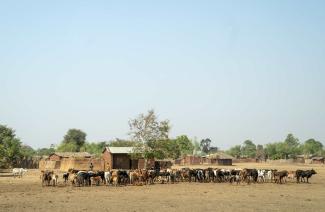Labour market
Developing Malawi’s food sector
 picture-alliance/empics/Jane Barlow/PA Wire
Processing cow’s milk locally can create jobs.
picture-alliance/empics/Jane Barlow/PA Wire
Processing cow’s milk locally can create jobs.
Malawi’s economy depends on agriculture, which employs over 80 % of the population, according to World Bank data. Productivity remains low and keeps the food sector from meeting the rising demand. The gap is filled by imports.
Despite the large share of the agricultural sector, less than two percent of Malawi’s population work in the country’s food processing industry. There are only few businesses, and they suffer from limited technical and business capacity, lack of financing and poor linkages to both farmers and the consumer market. The industry largely consists of small and medium-sized businesses, including cooperatives, which deserve particular attention.
A cooperative is a business jointly owned and democratically controlled by its members to meet their shared needs. The members share collective responsibilities, and each of them has a say in how the business is run. Benefits derived from the cooperative are distributed equitably among the members. Cooperatives cut across all sectors of Malawi’s economy with agro-business cooperatives leading the pack at 70 %. Financial cooperatives follow at 10 %. Other industries include beekeeping, furniture, mining and services like cleaning.
Creating new jobs
Cooperatives play a vital role in generating jobs in Malawi, and they have the potential to become even more important, including for the country’s food processing industry. Take, for example, Bvumbwe Dairy Farmers Cooperative Society (BDFCS), Malawi’s oldest dairy cooperative. It started in 1998 with 10 farmers who were given two cows each by the government. Over the years, the cooperative’s membership swelled to 1500 farmers. Following the branching out of most members, it stands today at 71 farmers with 160 cows. The BDFCS employs both its members and seven additional staff for daily operations.
One of the staff members is 25-year-old Lucia Mwale. She works at the BDFCS factory at Bvumbwe Trading Center in the rural district of Thyolo, about 30 kilometres south of Blantyre, Malawi’s second largest city. Mwale operates a milk processing machine for the production of value-added products such as yogurt and chambiko, a local sour milk product.
A single mother who once struggled with unemployment, Mwale found a new lease of life through her role at BDFCS. “When I left my first job as a shopkeeper, I stayed unemployed for four years,” she said. “I am now able to provide for myself and my child.”
Malawi’s most established food processing companies are located in the country’s three main cities Blantyre, Lilongwe and Mzuzu. However, it is rural cooperatives like BDFCS that provide opportunities where job prospects are particularly dim. “Indeed, our cooperative and many others can really change the narrative here, where unemployment looms large,” says BDFCS secretary Charles Jota. “Our goal is to one day sell our yogurt, chambiko and milk in retail shops across the country, just like the way these established dairy companies do. Once we do that, we are going to employ a lot of people,” he adds.
Hindered by bureaucracy
Like many other businesses in Malawi, BDFCS is facing hurdles. Market access and growth are crucial issues. “Our small size hinders us from creating more jobs. The first step towards expansion hinges on obtaining certification from the Malawi Bureau of Standards, enabling us to market our products nationwide,” says Charles Jota. He deplores that BDFCS has been unsuccessfully applying for a certification since one year and thus remains limited to distributing its products on the local market in Thyolo.
Cumbersome procedures to get Malawi Bureau of Standards certification are a common problem for many small or medium businesses in agro-processing like BDFCS, hindering them to diversify their market reach and extend beyond the rural sphere. Relying solely on the rural market, however, can prove financially insufficient to fuel growth.
While challenges persist, Smith Nkhata, a lecturer specialised in food technology and nutritional sciences at Lilongwe University of Agriculture and Natural Resources, believes cooperatives are a working model to uplift economies in Malawi. “Beyond offering livelihoods, cooperatives embody a larger vision. One where sustainable expansion not only supports employment but also nourishes a community’s socio-economic fabric,” he says. Nkhata points out that employees in food processing require thorough and proper training in order to contribute to more impactful growth.
Local food processing
According to Nkhata, most established food processors gravitate towards urban centres for the availability of expertise, electricity and established markets which ultimately leaves the rural areas as a mere source of raw materials. He proposes a transformative approach of fostering value addition at the grassroots level.
The merits of establishing processing in plants in rural areas are plentiful, Nkhata explains. For example, proximity to raw materials offers advantages. Numerous companies headquartered in urban hubs source their raw materials from remote regions, incurring substantial transportation costs. By contrast, processing units in rural areas could not only harness local resources and offer much-needed employment but also present cost-effective alternatives for established food processing players.
For individuals like Lucia Mwale, BDFCS has not only provided a livelihood but also ignited a passion for food processing. “I continue to learn a lot,” she says. “I hope one day to have my own diary business and employ as many people as I can.”
Rabson Kondowe is a journalist based in Blantyre, Malawi.
kondowerabie@gmail.com


